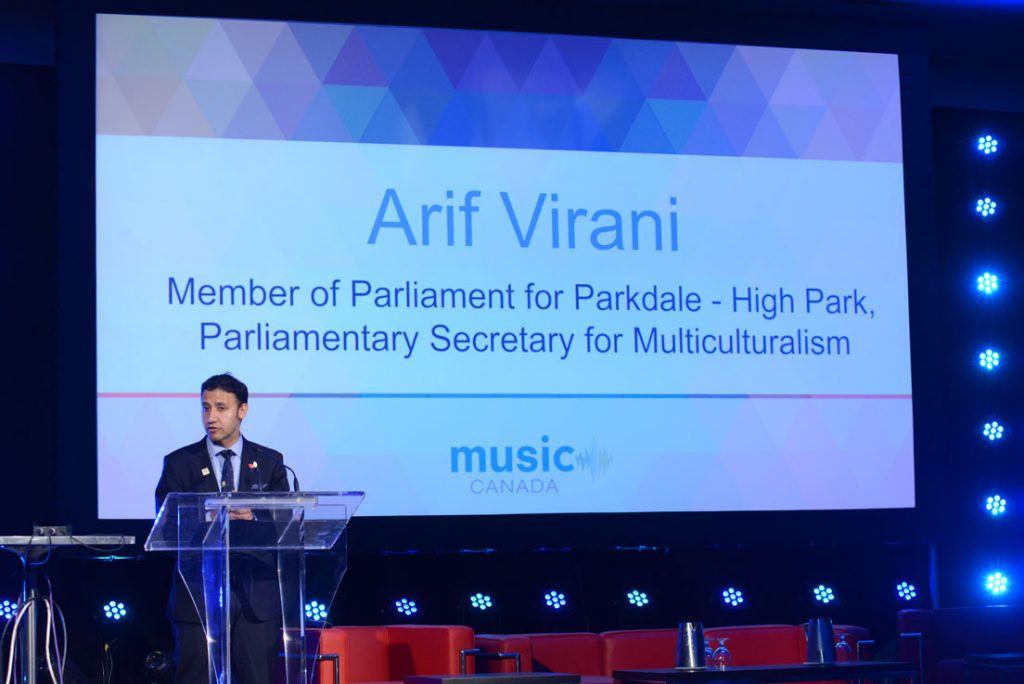Today, Music Canada CEO Patrick Rogers delivered remarks at Canadian Music Week’s opening keynote, “State of the Industry: A(nother) Year of Change.” Looking back on a year that changed everything (again!) Patrick shared his views on how the industry is working together to navigate seismic events like generative AI and the Online Streaming Act implementation.
Read his full remarks below.
Good morning,
It is my absolute pleasure to welcome you to the opening of Canadian Music Week and our morning of Music Canada programming.
What a year it’s been since last year’s CMW. We’ve seen government, regulators, industry, artists, and streaming platforms come to grips with what’s next in regulating the digital space. Simultaneously, we have seen many of those same players try to get their heads around the AI of today, the AI of tomorrow and the AI that we must guard against.
In just a couple of moments, I’m going to sit down with renowned economist and digital streaming expert Will Page to talk about the realities of streaming, glocalisation, Canada’s place in the global market and what we all need to understand as the CRTC ramps up its next phase of consultations.
After that, we are going to hear from Human Artistry Campaign’s Dr Moiya McTier, and Sony Music Entertainment’s Chris Frankenberg who are going to share their views on the industry’s efforts on AI and what we should be looking out for here in Canada.
I am very excited to hear from these two experts but while I’m up here let me tell you the two things about AI that I have become certain of since last year’s CMW.
The first is there is no doubt that the ingestion of songs to train AI is a use of copyright – everyone’s copyright in a song. We need to remember that AI is simply a technology – and copyright is the framework used to protect the VALUE of the art.
In so many ways, none of this is new. Every time a new technology comes around that harvests, mines or ingests that VALUE for free we have this debate. But I feel good about where we stand on this and am proud to join creators in the protection of the value of their creations.
Now, why do I feel this way – well, I could tell you that I can’t help but notice that those who spent the last 30 years as professors, lawyers and consultants for the anti-copyright movement have all suddenly become professors, lawyers and consultants for the AI-should-be-allowed-to-steal everything movement. It’s amazing really.
But the other reason that I know this is a copyright issue is because of the outputs. The undeniable voice of Johnny Cash singing Barbie World only proves that the AI was trained on Johnny Cash and Aqua. Or take the generated image that just happens to include someone else’s watermark – that proves the same thing. This past year has taught us that these systems aren’t actually creating anything truly new. Only humans can do that.
Our industry is an early adopter of AI and we’re excited about what AI can bring to Human Creative expression. But we need credit, compensation and consent. Creators must be able to decide IF and HOW their life’s work is used and they must be able to negotiate for that value in a fair market.
But I’m optimistic that if we respect creators and the copyright framework, we can go from the world’s most complicated paint-by-numbers to something truly magnificent.
The second thing I’ve become convinced of over this past year is the very real – and very urgent – danger of deepfakes. The pace at which the technology has accelerated from “I don’t think that’s real” to “I need to check if that is real” is terrifying. This isn’t just a music industry issue – it’s a society issue. Music Canada has spent a lot of time talking to politicians about this over the last year. What’s so striking is that, while we have laws to prevent impersonation or stealing a persona over the phone, in magazine advertisements and on billboards – and everyone agrees this is important – there’s still uncertainty about what to do about AI impersonations.
Our answer is simple – make what’s illegal in the analogue world – illegal in the digital world.
Deepfakes aren’t just a problem for our top artists, or world leaders, they are increasingly becoming a threat to hard working Canadians and distressingly – their kids. All Canadians deserve a clear publicity right that protects how their name, image and likeness is used. We are going to keep working on this and I look forward to reporting back to you next year.
Turning to Music Canada’s other priority in the digital space – CRTC’s work to implement the Online Streaming Act and their updated roadmap.
At Music Canada, we take this process really seriously, I believe it’s a once in a generation regulatory process and ALL involved, should treat it as such.
But I do think that it would be helpful to break down why I think it’s so important.
I’ll start with the simplest. We’ve had home internet broadly available in this country for 30-plus years. And we all learned to make the most of it without a Canadian regulatory body overlooking it for that entire time. So much so that on April 26, 2023 digital platforms in Canada were not regulated – and on April 27, 2023 – with the passage of the Online Streaming Act, they were . That’s always felt to me like a big change.
It’s why I believe that the CRTC should be encouraged to build the very best regulatory system for the digital platforms and the Canadian creators that create the songs that have seen us all flock to the services.
What we cannot do is simply try to graft the old radio rules to the global digital economy in which Canadian artists are finding success and that consumers enjoy.
We also simply cannot ignore the presence, investment and contribution of the platforms to the Canadian industry during the unregulated time. It matters that the platforms have teams based in Canada – everyone in this room knows how important that is to help artists reach their fans around the world. The same is true of our members – Canada’s major labels – with brand new buildings full of Canadians focused on Canadian artists and their global success.
In one of the most powerful parts of the Phase 1 consultations at the CRTC in November, Patrick Aldous from Nettwerk warned that we must not forget the damage done to the music industry in the dark days of the digital piracy era – and that those dark days have been replaced by a licensed streaming era that has opened doors for Canadian and Indigenous artists to build global fanbases.
To me, this means that regulation must not interfere with the listening experience on streaming platforms or we risk driving users back to unlicensed services.
If this regulation is going to work, we need to build a system for today and tomorrow and not simply try to catch up on 30 years of lack of regulation.
That’s why I believe it’s time to turn over every stone. Really REALLY understand streaming. How Canadians listen, how artists benefit from it; dive deeply into how we can create more success.
It’s also why I’m so skeptical of those who encourage us to turn over NO stones.
Here’s what I think we will find when we really really dive in and look carefully at all aspects of the streaming market and our regulatory framework: at its heart, we will find artists. Canadian and Indigenous Artists in every corner of this country singing, writing, rapping and performing. Not just for audiences in Toronto, Vancouver and Montreal or EVEN New York but for fanbases made possible by the global digital industry in Nigeria, Senegal and India.
Canadian artists don’t need a “made-in-Canada ceiling” to “keep them here.” They need and importantly WANT a map of the world.
We need a system that encourages Canadian artists to work with the best in the world so that they can compete with the world.
We have a lot of work to do. Because streaming isn’t just different from radio it’s the opposite.
I’m going to explain how I know this to be true. Not because Will Page told me so but because my dad would blow my mind on road trips when I was a kid.
Whenever we were in the car for any great length of time, with my Dad at the wheel, my Mom would flip to Q107, CHUM FM or CHFI on the dial in our Ford Tempo. After only a second or two, she would turn the volume dial to 0. After a little bit of humming to himself, my dad would either name the tune – or if he was feeling especially showy – he would join the song in progress.
Now there’s a lot going on here – first let’s give my dad some credit – it’s a cool party trick. Developed by a misspent youth locked away in his bedroom listening to endless amounts of music – but – it’s also an explainable mathematical equation.
A generation ago, it was possible to know every second of every song in the most popular genres because making it to radio, being broadcast, was the beginning of truly making it.
Our regulatory system is built for my Dad’s party trick.
But, today, joining the 120,000 songs uploaded to platforms every DAY is barely the beginning of the beginning.
And yet – more artists around the world are being listened to more than ever by more people in more genres than ever – thanks to streaming. Canada is a success story in the global digital economy.
Our new regulatory system needs to reflect that. It needs to respect the new players in the space, understand the modern paths to success and truly WANT TO MAKE the decisions required to help make Canadian artists into global stars.
With that, let’s start that process with someone who truly understands what we’re talking about – an economist and expert on music streaming, Will Page.







 Canadian Music Week
Canadian Music Week















Music Canada